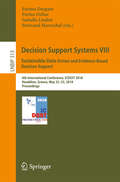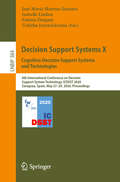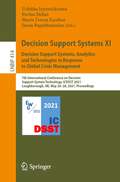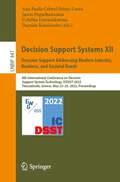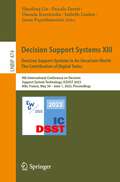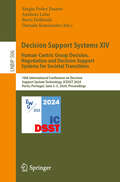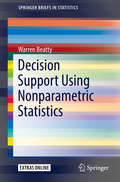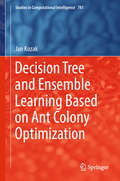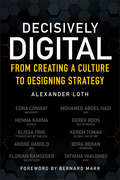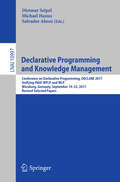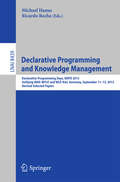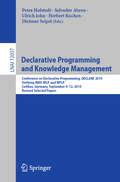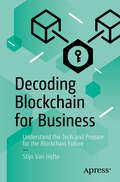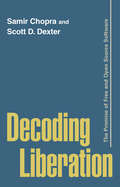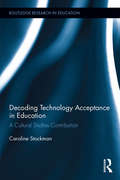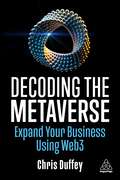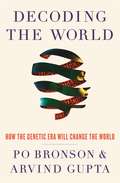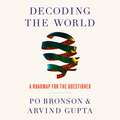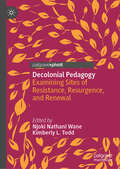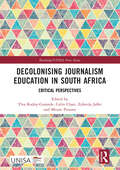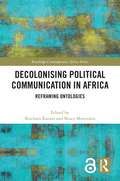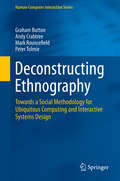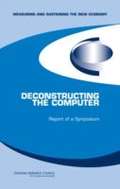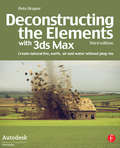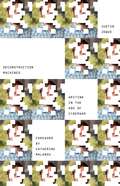- Table View
- List View
Decision Support Systems VIII: 4th International Conference, ICDSST 2018, Heraklion, Greece, May 22–25, 2018, Proceedings (Lecture Notes in Business Information Processing #313)
by Fatima Dargam Pavlos Delias Isabelle Linden Bertrand MareschalThis book constitutes the proceedings of the 4th International Conference on Decision Support Systems, ICDSST 2018, held in Heraklion, Greece, in May 2018. The main topic of this year’s conference was “Sustainable Data-Driven and Evidence Based Decision Support”. The 15 papers presented in this volume were carefully reviewed and selected from 71 submissions. They were organized in topical sections named: decision support systems for a sustainable society; decision support systems serving the public; decision support systems in management and organization; and advances in decision support systems’ technologies and methods. The EWG-DSS series of International Conference on Decision Support System Technology (ICDSST), starting with ICDSST 2015 in Belgrade, were planned to consolidate the tradition of annual events organized by the EWG-DSS in offering a platform for European and international DSS communities, comprising the academic and industrial sectors, to present state-of-the-art DSS research and developments, to discuss current challenges that surround decision-making processes, to exchange ideas about realistic and innovative solutions, and to co-develop potential business opportunities.
Decision Support Systems X: 6th International Conference on Decision Support System Technology, ICDSST 2020, Zaragoza, Spain, May 27–29, 2020, Proceedings (Lecture Notes in Business Information Processing #384)
by José María Moreno-Jiménez Isabelle Linden Fatima Dargam Uchitha JayawickramaThis book constitutes the proceedings of the 6th International Conference on Decision Support Systems Technologies, ICDSST 2020, organised in Zaragoza, Spain, in May 2020. The conference was held online only due to the Corona pandemic. The EWG-DSS series of International Conference on Decision Support System Technology (ICDSST) is planned to consolidate the tradition of annual events organized by the EWG-DSS in offering a platform for European and international DSS communities, comprising the academic and industrial sectors, to present state-of-the-art DSS research and developments, to discuss current challenges that surround decision-making processes, to exchange ideas about realistic and innovative solutions, and to co-develop potential business opportunities. The main topic of this year’s conference was “Cognitive Decision Support Systems and Technologies”. The 13 papers presented in this volume were carefully reviewed and selected from 51 submissions. They were organized in topical sections named: methodological contributions; case studies and applications; and overview (on the current state and future trends of DSS, BI, and data analytics research).
Decision Support Systems XI: 7th International Conference on Decision Support System Technology, ICDSST 2021, Loughborough, UK, May 26–28, 2021, Proceedings (Lecture Notes in Business Information Processing #414)
by Uchitha Jayawickrama Pavlos Delias María Teresa Escobar Jason PapathanasiouThis book constitutes the proceedings of the 7th International Conference on Decision Support Systems Technologies, ICDSST 2021, held during May 26-28, 2021. The conference was planned to take place in Loughborough, UK, and changed to an online format due to the COVID-19 pandemic.The EWG-DSS series of International Conference on Decision Support System Technology (ICDSST) is planned to consolidate the tradition of annual events organized by the EWG-DSS in offering a platform for European and international DSS communities, comprising the academic and industrial sectors, to present state-of-the-art DSS research and developments, to discuss current challenges that surround decision-making processes, to exchange ideas about realistic and innovative solutions, and to co-develop potential business opportunities. The main aim of this year’s conference is to investigate the role DSS and related technologies can play in mitigating the impact of pandemics and post-crisis recovery. The 10 papers presented in this volume were carefully reviewed and selected from 44 submissions. They were organized in two topical sections named: multiple criteria approaches and advances in decision support systems’ technologies and methods.
Decision Support Systems XII: 8th International Conference on Decision Support System Technology, ICDSST 2022, Thessaloniki, Greece, May 23–25, 2022, Proceedings (Lecture Notes in Business Information Processing #447)
by Ana Paula Cabral Seixas Costa Jason Papathanasiou Uchitha Jayawickrama Daouda KamissokoThis book constitutes the proceedings of the 8th International Conference on Decision Support Systems Technologies, ICDSST 2022, held during May 23-25, 2022.The EWG-DSS series of International Conference on Decision Support System Technology (ICDSST) is planned to consolidate the tradition of annual events organized by the EWG-DSS in offering a platform for European and international DSS communities, comprising the academic and industrial sectors, to present state-of-the-art DSS research and developments, to discuss current challenges that surround decision-making processes, to exchange ideas about realistic and innovative solutions, and to co-develop potential business opportunities. The main aim of this year’s conference is to investigate the role DSS and related technologies can play in mitigating the impact of pandemics and post-crisis recovery. The 15 papers presented in this volume were carefully reviewed and selected from 46 submissions. They were organized in topical sections as follows: decision support addressing modern industry; decision support addressing business and societal needs, and multiple criteria approaches.
Decision Support Systems XIII. Decision Support Systems in An Uncertain World: 9th International Conference on Decision Support System Technology, ICDSST 2023, Albi, France, May 30 – June 1, 2023, Proceedings (Lecture Notes in Business Information Processing #474)
by Shaofeng Liu Pascale Zaraté Daouda Kamissoko Isabelle Linden Jason PapathanasiouThis book constitutes the proceedings of the 9th International Conference on Decision Support Systems Technologies, ICDSST 2023, held during May 30 – June 1, 2023.The EWG-DSS series of International Conference on Decision Support System Technology (ICDSST) is planned to consolidate the tradition of annual events organized by the EWG-DSS in offering a platform for European and international DSS communities, comprising the academic and industrial sectors, to present state-of-the-art DSS research and developments, to discuss current challenges that surround decision-making processes, to exchange ideas about realistic and innovative solutions, and to co-develop potential business opportunities. The main theme of this year was “Decision Support Systems in An Uncertain World: The Contribution of Digital Twins”. The 21 papers presented in this volume were carefully reviewed and selected from 65 submissions. They were organized in topical sections as follows: DSS models, methods, and tools; DSS for business performance and stakeholders; DSS applications for sustainability in health, energy and transportation; and DSS users and successful adoption.
Decision Support Systems XIV. Human-Centric Group Decision, Negotiation and Decision Support Systems for Societal Transitions: 10th International Conference on Decision Support System Technology, ICDSST 2024, Porto, Portugal, June 3–5, 2024, Proceedings (Lecture Notes in Business Information Processing #506)
by Sérgio Pedro Duarte António Lobo Boris Delibašić Daouda KamissokoThis book constitutes the proceedings of the 10th International Conference on Decision Support Systems Technologies, ICDSST 2024, held in June 2024. The EWG-DSS series of International Conference on Decision Support System Technology (ICDSST) is planned to consolidate the tradition of annual events organized by the EWG-DSS in offering a platform for European and international DSS communities, comprising the academic and industrial sectors, to present state-of-the-art DSS research and developments, to discuss current challenges that surround decision-making processes, to exchange ideas about realistic and innovative solutions, and to co-develop potential business opportunities. This year the main topic was: Human-Centric Group Decision, Negotiation and Decision Support Systems for Societal Transitions. The 10 full papers included in these proceedings were carefully reviewed and selected from 29 submissions. They have been organized in topical sections as follows: Decision support tools and methods; and decision factors.
Decision Support Using Nonparametric Statistics
by Warren BeattyThis concise volume covers nonparametric statistics topics that most are most likely to be seen and used from a practical decision support perspective. While many degree programs require a course in parametric statistics, these methods are often inadequate for real-world decision making in business environments. Much of the data collected today by business executives (for example, customer satisfaction opinions) requires nonparametric statistics for valid analysis, and this book provides the reader with a set of tools that can be used to validly analyze all data, regardless of type. Through numerous examples and exercises, this book explains why nonparametric statistics will lead to better decisions and how they are used to reach a decision, with a wide array of business applications. Online resources include exercise data, spreadsheets, and solutions.
Decision Tree and Ensemble Learning Based on Ant Colony Optimization (Studies in Computational Intelligence #781)
by Jan KozakThis book not only discusses the important topics in the area of machine learning and combinatorial optimization, it also combines them into one. This was decisive for choosing the material to be included in the book and determining its order of presentation. Decision trees are a popular method of classification as well as of knowledge representation. At the same time, they are easy to implement as the building blocks of an ensemble of classifiers. Admittedly, however, the task of constructing a near-optimal decision tree is a very complex process. The good results typically achieved by the ant colony optimization algorithms when dealing with combinatorial optimization problems suggest the possibility of also using that approach for effectively constructing decision trees. The underlying rationale is that both problem classes can be presented as graphs. This fact leads to option of considering a larger spectrum of solutions than those based on the heuristic. Moreover, ant colony optimization algorithms can be used to advantage when building ensembles of classifiers.This book is a combination of a research monograph and a textbook. It can be used in graduate courses, but is also of interest to researchers, both specialists in machine learning and those applying machine learning methods to cope with problems from any field of R&D.
Decisively Digital: From Creating a Culture to Designing Strategy
by Alexander LothDiscover how to survive and thrive in an increasingly digital world Digital strategy should consist of more than just updating your business’ desktop computers and buying the newest smartphones for your employees. It requires the reimagining of existing business processes and the implementation of the latest technologies into current business activity to enable new capabilities for your firm. In Decisively Digital: From Creating a Culture to Designing Strategy, digital strategy advisor and author Alexander Loth leverages his extensive experience working with Microsoft, CERN, and SAP to deliver a robust and accessible exploration of what it takes for a company to unlock the potential of new digital technologies. You’ll discover how to: Utilize new technologies to establish a digital culture and realize the benefits of modern work for your employees Unleash the abilities that come with processing big data and taking advantage of data democracy, analytics, and cloud computing Implement artificial intelligence, blockchain, process automation, and IoT in a way that goes beyond the hype and delivers real business results Packed with interviews with industry leaders and real-world customer examples, Decisively Digital is ideal for CIOs, CDOs, and other executives and professionals who need to know how technology can improve their businesses and power results today and tomorrow.
Declarative Programming and Knowledge Management: Declarative Programming Days, Kdpd 2013, Unifying Inap, Wflp, And Wlp, Kiel, Germany, September 11-13, 2013, Revised Selected Papers (Lecture Notes in Computer Science #8439)
by Salvador Abreu Michael Hanus Dietmar SeipelThis book constitutes revised selected papers from the 21st International Conference on Applications of Declarative Programming and Knowledge Management, INAP 2017, the 31st Workshop on Logic Programming, WLP 2017, and the 25th Workshop on Functional and (Constraint) Logic Programming, WFLP 2017. The 12 full papers presented in this volume were carefully reviewed and selected from 26 submissions. The contributions were organized in topical sections named: constraints; declarative systems; and functional and logic programming.
Declarative Programming and Knowledge Management
by Michael Hanus Ricardo RochaThis book constitutes the proceedings of the Kiel Declarative Programming Days, KDPD 2013, unifying the following conferences: the 20th International Conference on Applications of Declarative Programming and Knowledge Management (INAP 2013), the 22nd International Workshop on Functional and (Constraint) Logic Programming (WFLP 2013) and the 27th Workshop on Logic Programming (WLP 2013), held in Kiel, Germany, in September 2013. The 15 papers presented were carefully and reviewed and selected for inclusion in this book. They cover the following topics: logic programming, constraint problem solving, programmable logic solvers, functional programming and constraint programming.
Declarative Programming and Knowledge Management: Conference on Declarative Programming, DECLARE 2019, Unifying INAP, WLP, and WFLP, Cottbus, Germany, September 9–12, 2019, Revised Selected Papers (Lecture Notes in Computer Science #12057)
by Petra Hofstedt Salvador Abreu Ulrich John Herbert Kuchen Dietmar SeipelThis book constitutes revised selected papers from the 22nd International Conference on Applications of Declarative Programming and Knowledge Management, INAP 2019, the 33rd Workshop on Logic Programming, WLP 2019, and the 27th Workshop on Functional and (Constraint) Logic Programming, WFLP 2019. The 15 full papers and 1 short paper presented in this volume were carefully reviewed and selected from 24 submissions. The contributions present current research activities in the areas of declarative languages and compilation techniques, in particular for constraint-based, logical and functional languages and their extensions, as well as discuss new approaches and key findings in constraint-solving, knowledge representation, and reasoning techniques.
Decoding Blockchain for Business: Understand the Tech and Prepare for the Blockchain Future
by Stijn Van HijfteBusiness professionals looking to understand the impact, future, and limitations of blockchain need look no further. This revolutionary technology has impacted business and the economy in unprecedented ways within the past decade, and it is only continuing to grow. As a leader in your organization, it is vital that you decode blockchain and optimize all the ways in which it can improve your business.Author of Decoding Blockchain for Business, Stijn Van Hijfte, expertly emphasizes the imperative of professionals in any sector of industry to understand the core concepts and implications of blockchain technology. Cryptocurrencies, cryptotrading, and constantly-changing tax structures for financial systems using blockchain technologies are covered in detail. The lasting effects of blockchain across specific industries such as media, real estate, finance, and regulatory bodies are addressed with an insightful eye from Van Hijfte.If not properly implemented with care and a foundation of knowledge, blockchain brings risks and uncertainties to a company. Know your technology to be ready for the present and the future, and stay ahead of the curve. Blockchain is here to stay, and Decoding Blockchain for Business is your professional roadmap. What You Will Learn Discover the risks associated with blockchain if not properly implemented Gain insights on how blockchain technology affects other booming topics such as AI, IoT, and RPA Look at the regulations surrounding Blockchain in different countries Who This Book Is For Business professionals looking to understand the impact, future, and limitations of Blockchain and how individuals and companies should prepare for this technology.
Decoding Liberation: The Promise of Free and Open Source Software (Routledge Studies in New Media and Cyberculture)
by Samir Chopra Scott D. DexterSoftware is more than a set of instructions for computers: it enables (and disables) political imperatives and policies. Nowhere is the potential for radical social and political change more apparent than in the practice and movement known as "free software." Free software makes the knowledge and innovation of its creators publicly available. This liberation of code—celebrated in free software’s explicatory slogan "Think free speech, not free beer"—is the foundation, for example, of the Linux phenomenon. Decoding Liberation provides a synoptic perspective on the relationships between free software and freedom. Focusing on five main themes—the emancipatory potential of technology, social liberties, the facilitation of creativity, the objectivity of computing as scientific practice, and the role of software in a cyborg world—the authors ask: What are the freedoms of free software, and how are they manifested? This book is essential reading for anyone interested in understanding how free software promises to transform not only technology but society as well.
Decoding Technology Acceptance in Education: A Cultural Studies Contribution (Routledge Research in Education)
by Caroline StockmanThe process of integrating technology into education often overlooks that technology is a sign; it is not a neutral message conveyor, but rather a material artefact placed into a context inevitably subject to culture. In an original and novel combination, Decoding Technology Acceptance in Education brings together two academic domains not previously pursued together, yet which diverge in many ways: cultural studies and technology acceptance studies. Drawing on empirical data, Stockman demonstrates that teachers activate a meaning-making process through encoding and decoding signs around technology as an artefact of culture, and as a result their acceptance behaviour and decisions rely on the dynamics of the cultural whole to which they belong. In this study, technology acceptance is revisited as an issue of cultural negotiation; the common approach, which provides an instrumental view on technology as a neutral tool, is insufficient for the topic of technology acceptance. Rather than proposing yet another model of technology acceptance, Decoding Technology Acceptance in Education offers a renewed frame of mind and the conclusions it provides are of vital importance to the theoretical and practical advancement of technology acceptance studies, as well as to the practical integration of technology into education. Providing original empirical evidence for the influence of culture on educational decision-making, the book raises awareness for the importance of cultural research in areas where it has been under-considered. This book will be of great interest to researchers, academics and postgraduate students engaged in the study of technology acceptance and technology use in education, as well as those interested in cultural studies.
Decoding the Metaverse: Expand Your Business Using Web3
by Chris DuffeyDiscover the profitable business opportunities within the metaverse and learn how you can and why you should get your company involved today. In Decoding the Metaverse, Creative Cloud strategist and Web3 expert Chris Duffey establishes a roadmap for entry to the metaverse. Written to help businesses get a handle on a complex new business opportunity, the book begins by explaining how previous iterations of the internet led to the creation of immersive digital technology with Web3 before detailing the building blocks of the metaverse. The book takes readers through the future of digital spaces, offering insight into immersive experiences, customer engagement, product-led growth and profitability. The chapters focus on the building blocks of the metaverse, including NFTs, blockchain, tokenomics, gaming and virtual real estate. Each chapter is paired with a corresponding case study from well-known brands currently working in the metaverse. Decoding the Metaverse ends with guiding principles about the ethical ramifications of immersive experiences and digital governance.Throughout Decoding the Metaverse, Duffey highlights the importance of reaching customers through shared immersive experiences. Showcasing the potential impact of working with Web3, he explains how companies can use these opportunities to further their reach and grow their revenue. Readers will step away from the book eager to get their companies involved today.
Decoding the World: A Roadmap For The Questioner
by Po Bronson Arvind GuptaA vision of the future where the latest Silicon Valley tech meets cutting-edge genetics.Decoding the World is a buddy adventure about the quest to live meaningfully in a world with such uncertainty. It starts with Po Bronson coming to IndieBio.Arvind Gupta created IndieBio as a laboratory for early biotech startups trying to solve major world problems. Glaciers melting. Dying bees. Infertility. Cancer. Ocean plastic. Pandemics.As they travel around the world, finding scientists to join their cause, the authors bring their first-hand experience to the great mysteries that haunt our future. Natural resource depletion. Job-taking robots. China's global influence.Decoding the World is the kind of book you get when you give two guys $40 million, a world full of messy big problems, a genetics laboratory to play in, and a set of Borges' collected works. After looking through their lens, you'll never see the world the same.
Decoding the World
by Po Bronson Arvind GuptaA vision of the future where the latest Silicon Valley tech meets cutting-edge genetics.Po Bronson and Arvind Gupta, venture capitalists from Silicon Valley, take everyday news headlines and decode them, leading us on a journey through their unique and highly entertaining view of the world. Each chapter is prefaced with a real-world headline from today's chaotic news cycle: Dying bees. Rogue planets. Beyond Meat. Glaciers melting. Bronson and Gupta decipher what's really going on behind these headlines, and why. They offer first-hand experience in funding technologies to solve these problems, most of which involve genetic engineering.But what the authors then do with that premise is always surprising and unexpected. One moment they are ripping it down to the bare bones physics or chemistry, and then they invoke history, philosophy, or psychology, all the while using joyful literary devices and storylines from popular movies. Decoding the World is the kind of book you get when you give two guys $40 million, a world full of messy big problems, a genetics laboratory to play in, and a set of Borges' collected works. After looking through their lens, you'll never see the world the same.(P)2020 Hachette Audio
Decolonial Pedagogy: Examining Sites of Resistance, Resurgence, and Renewal
by Njoki Nathani Wane Kimberly L. ToddThrough innovative and critical research, this anthology inquires and challenges issues of race and positionality, empirical sciences, colonial education models, and indigenous knowledges. Chapter authors from diverse backgrounds present empirical explorations that examine how decolonial work and Indigenous knowledges disrupt, problematize, challenge, and transform ongoing colonial oppression and colonial paradigm. This book utilizes provocative and critical research that takes up issues of race, the shortfalls of empirical sciences, colonial education models, and the need for a resurgence in Indigenous knowledges to usher in a new public sphere. This book is a testament of hope that places decolonization at the heart of our human community.
Decolonising Journalism Education in South Africa: Critical Perspectives (Routledge/UNISA Press Series)
by Ylva Rodny-Gumede Colin Chasi Zubeida Jaffer Mvuso PononoThis book is the culmination of several years of collaborative work. It is a unique contribution to the field of journalism because of the depth and variety of contributions it makes to the field. The scholars who contribute to this volume respond to the great need to rethink journalism from various perspectives including journalism training, research, the contents of the news media, language, media ethics, the safety of journalists and gender inequities in the news media. In doing this, they recognise how the societies that journalism address should themselves change.
Decolonising Political Communication in Africa: Reframing Ontologies (Routledge Contemporary Africa)
by Beschara Karam Bruce MutsvairoThis book uses decolonisation as a lens to interrogate political communication styles, performance, and practice in Africa and the diaspora. The book interrogates the theory and practice of political communication, using decolonial research methods to begin a process of self-reflexivity and the creation of a new approach to knowledge production about African political communication. In doing so, it explores political communication approaches that might until recently have been considered subversive or dissident: forms of political communication that served to challenge imposed western norms and to empower African citizens and their histories. Centring African scholarship, the book draws on case studies from across the continent, including Zimbabwe, South Africa, Nigeria and Ghana. This book will be of interest to students and scholars of politics, media and communication in Africa.
Deconstructing Ethnography
by Graham Button Andy Crabtree Mark Rouncefield Peter TolmieThis book aims to deconstruct ethnography to alert systems designers, and other stakeholders, to the issues presented by new approaches that move beyond the studies of 'work' and 'work practice' within the social sciences (in particular anthropology and sociology). The theoretical and methodological apparatus of the social sciences distort the social and cultural world as lived in and understood by ordinary members, whose common-sense understandings shape the actual milieu into which systems are placed and used. In Deconstructing Ethnography the authors show how 'new' calls are returning systems design to 'old' and problematic ways of understanding the social. They argue that systems design can be appropriately grounded in the social through the ordinary methods that members use to order their actions and interactions. This work is written for post-graduate students and researchers alike, as well as design practitioners who have an interest in bringing the social to bear on design in a systematic rather than a piecemeal way. This is not a 'how to' book, but instead elaborates the foundations upon which the social can be systematically built into the design of ubiquitous and interactive systems.
Deconstructing the Computer: Report of a Symposium
by National Research Council of the National AcademiesStarting in the mid 1990s, the United States economy experienced an unprecedented upsurge in economic productivity. Rapid technological change in communications, computing, and information management continue to promise further gains in productivity, a phenomenon often referred to as the New Economy. To better understand this phenomenon, the National Academies Board on Science, Technology, and Economic Policy (STEP) has convened a series of workshops and commissioned papers on Measuring and Sustaining the New Economy. This major workshop, entitled Deconstructing the Computer, brought together leading industrialists and academic researchers to explore the contribution of the different components of computers to improved price-performance and quality of information systems. The objective was to help understand the sources of the remarkable growth of American productivity in the 1990s, the relative contributions of computers and their underlying components, and the evolution and future contributions of the technologies supporting this positive economic performance.
Deconstructing the Elements with 3ds Max: Create natural fire, earth, air and water without plug-ins
by Pete Draper3ds Max is the leading 3D modeling, animation, and rendering solution for artists, schools, and production environments. The unique tutorial approach of this book permits readers to learn essential techniques that every 3D artist needs to create CG environments by recreating the earth's elements of earth, air, fire and water. No extra plug-ins are required to perform the exercises. Draper studies the real world and then simlates it with 3ds Max -a unique approach that reflects classical art training."Deconstructing the Elements" allows artists to re-create natural effects using Autodesk® 3ds Max®. This new edition boasts all new tutorials. All editorial content is updated to be current with the current version of 3ds Max. Inspirational images cover every page as the author shares his professional insight, detailing the how and why of each effect, ensuring the reader a complete understanding of all the processes involved. The companion web site includes all of the tutorials from the previous two editions, only available to purchasers of this 3rd edition - plus all new tutorials of the current edition. It's like getting 3 books in one!
Deconstruction Machines: Writing In The Age Of Cyberwar (Electronic Mediations Ser. #54)
by Justin Joque Catherine MalabouA bold new theory of cyberwar argues that militarized hacking is best understood as a form of deconstruction From shadowy attempts to steal state secrets to the explosive destruction of Iranian centrifuges, cyberwar has been a vital part of statecraft for nearly thirty years. But although computer-based warfare has been with us for decades, it has changed dramatically since its emergence in the 1990s, and the pace of change is accelerating.In Deconstruction Machines, Justin Joque inquires into the fundamental nature of cyberwar through a detailed investigation of what happens at the crisis points when cybersecurity systems break down and reveal their internal contradictions. He concludes that cyberwar is best envisioned as a series of networks whose constantly shifting connections shape its very possibilities. He ultimately envisions cyberwar as a form of writing, advancing the innovative thesis that cyber attacks should be seen as a militarized form of deconstruction in which computer programs are systems that operate within the broader world of texts. Throughout, Joque addresses hot-button subjects such as technological social control and cyber-resistance entities like Anonymous and Wikileaks while also providing a rich, detailed history of cyberwar. Deconstruction Machines provides a necessary new interpretation of deconstruction and timely analysis of media, war, and technology.
